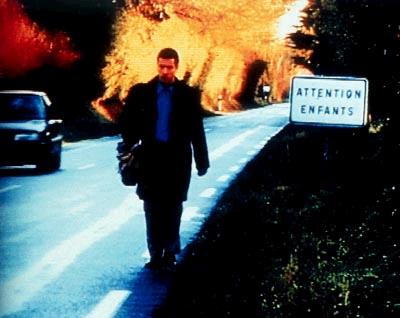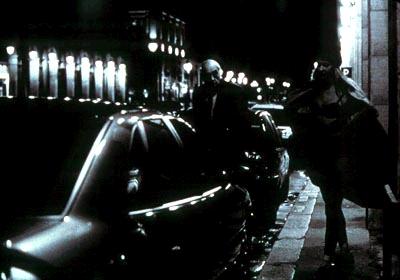In Praise of Love
(Eloge de L'Amour)


People say that French director Jean-Luc Goddard is a master. His films are ridiculously obtuse and difficult to understand, but usually operate on a higher level than that of most other films. But, is he good because he actually is, or because people say he is? Goddard has an esteemed body of work that is now in its fifth decade, but judging by In Praise of Love, Goddard (Origins of the 21st Century, The Old Place) fulfills most of the stereotypes of the pretentious French movie. This movie is a snoozer, and a nearly incomprehensible one at that. It is a rambling piece of work, overindulgent in some aspects and frustratingly hard to understand in others. It doesn't help that the subtitles don't always translate all the dialogue. Goddard sometimes has two people speaking at once, and at others has ambient noise drowning out the dialogue (but the latter is on purpose). He also frequently masks his speakers' faces in the shadows.
For all its faults, the cinematography in In Praise of Love is stunning. Goddard divides the movie into two sections, the first filmed in shimmering black and white and the second in digital. The black and white scenes evoke a bygone era, and it's almost enough to sit and watch the images flash across the screen (trying to understand it is another matter). The images are never that crisp, but still stand out. A stream of (possibly) non sequitor scenes occur, and many of them are quite memorable. A man sits flipping through a book of blank pages, a woman washes a man's shoulders, and a woman flashing a car are only some of them. Goddard can even make a bunch of cars driving down a road at night beautiful.
The digital scenes are also slightly out of focus, but even more artistic. They use bright, vibrant colors and Goddard slows them down, freezes them, and has them bleed together to form amorphous color collages. Nothing looks too real, and it frequently feels like a dream. Yet this section of the film, the latter portion, is the only one that makes any sense. It takes place two years before the first half. Edgar (Bruno Putzulu, All About Love, Manhood and Other Dilemmas) is negotiating to buy the rights to the story of two French Resistance fighters. The couple is now elderly, and their granddaughter is not too happy with the idea. Goddard has some things to say about Hollywood, but they are lost amongst the random babble.
The first section is the most confusing part. Bruno is trying to decide how to a story, whether it be in the form of a play, opera, or novel. His project deals with what he believes are the four stages of love; the meeting, passion, separation, and reconciliation. His project has three couples (young, adult, and elderly) whose relationships serve as examples of these stages. The screen frequently fades to black, and the narrative is purposefully vague, which confuses the viewer even more. The fact that all this takes place first considerably slows the pace of In Praise of Love, making the entire film a labor to sit through.